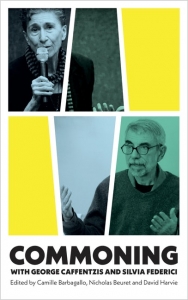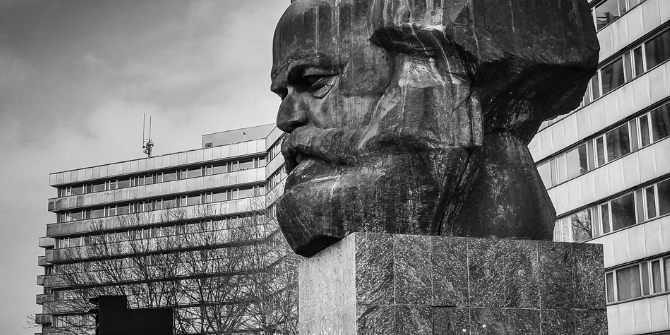The collection Commoning, edited by Camille Barbagallo, Nicholas Beuret and David Harvie, offers an impassioned tribute to the intellectual labours of George Caffentzis and Silvia Federici as well as the forms of thought and action that have emerged alongside them. Focusing particularly on the theoretical implication of their works as they specifically relate to land and the commons, Dominique Dillabough-Lefebvre finds that the volume overall does an exemplary job of placing action, social solidarity, feminist struggles and common labouring at the forefront of all of their thought
Commoning with George Caffentzis and Silvia Federici. Camille Barbagallo, Nicholas Beuret and David Harvie (eds). Pluto Press. 2019.
 The essays in Commoning, edited by Camille Barbagallo, Nicholas Beuret and David Harvie, offer an impassioned tribute to the intellectual labours of George Caffentzis and Silvia Federici as well as the forms of thought and action that have emerged alongside them. At a time when themes of care, social reproduction, class, gender and anti-Capitalist struggles are re-emerging at the forefront of the popular imagination, the contributors to this new volume acknowledge their profound debts to Caffentzis and Federici, whose work until recently has been largely ignored by major currents in academia, as well as their shared borrowings from members of the group known as the Midnight Notes Collective.
The essays in Commoning, edited by Camille Barbagallo, Nicholas Beuret and David Harvie, offer an impassioned tribute to the intellectual labours of George Caffentzis and Silvia Federici as well as the forms of thought and action that have emerged alongside them. At a time when themes of care, social reproduction, class, gender and anti-Capitalist struggles are re-emerging at the forefront of the popular imagination, the contributors to this new volume acknowledge their profound debts to Caffentzis and Federici, whose work until recently has been largely ignored by major currents in academia, as well as their shared borrowings from members of the group known as the Midnight Notes Collective.
In anthropology and social theory, I cannot help but note that the growing interest in themes of care and social reproduction is foreshadowed by Caffentzis and Federici’s work, whilst their discussions of Karl Marx’s category of primitive accumulation as a continual process defined by ‘new enclosures’ predates David Harvey’s fashionable formulation of ‘accumulation by dispossession’ by over a decade. This speaks to the salience of Caffentzis and Federici’s work to many of the shared experiences of people across the world. Commoning is a fitting tribute to these ideas and experiences, a fine blend of theory and praxis, which includes spirited contributions by some of Caffentzis and Federici’s friends, collaborators and those they have influenced, such as Harry Cleaver, Massimo De Angelis, Raquel Guttiérrez Aguilar, Peter Linebaugh and co-editor Barbagallo.
This review cannot hope to speak individually to the wide variety of contributions contained in this volume, ranging from comic strips, impassioned personal tributes, academic essays and critiques to activist accounts of struggles against processes of enclosure or gendered inequalities. I would, however, like to emphasise that these contributions both anticipate and highlight the myriad factors contributing to the current resurgence of interest – both in academia and wider social thought – in the key thematic foci of Caffentzis and Federici’s writings and struggles: namely value, social reproduction and ‘the commons’.
I was first exposed to the works of Federici and Caffentzis in a course on ‘Anthropological Theories of Value’ at LSE, taught by David Graeber. It rapidly became clear to me the intellectual debts his own thought owed to both Silvia and George’s work, as well as to those involved in the Midnight Notes Collective. His teaching of their scholarship, and their role in his reformulation of anthropological theories of value, social reproduction and care, seemed a fitting acknowledgement of the importance of their ideas in influencing his own thought. To my mind, it is in large part due to the work of scholars such as Federici and Caffentzis that anarchist and Marxist ideas have been brought together in anthropology, as these scholars’ thought and praxis creatively and non-dogmatically borrow from both traditions (see Don Kalb, 2014). It is ample time an even wider audience of academics, feminists, activists and others concerned with social theory and social transformation discovered their works, or for others to acknowledge the shared journeys or ideas which have, perhaps unwittingly, influenced their own thinking and action. While this review focuses more on the theoretical implications of Caffentzis and Federici’s work, specifically as they relate to land and the commons, the volume does an exemplary job at placing action, social solidarity, feminist struggles and common labouring at the forefront of all of their thought. For Caffentzis and Federici, theory is only one part of any struggle.
Revolutionary Histories
For Caffentzis and Federici, struggle is at the core of everyday life, to be found in the household, the factory, the streets, the fields and in university campuses. Their ‘militant feminist and anti-Capitalist scholarship’ thus touches on the struggles of the waged and the wageless, from Federici’s pioneering work on women’s domestic labour struggles (see Federici, 2004), to their shared illustration of the various ways peasants’, students’ and housewives’ unpaid labour are critical to the exploitation and propagation of past and current formations of Capitalism. Their work has been to trace the historical roots of such forms of exploitation, while aiming to uncover and fight against the structures and mechanisms which allow for their continued survival.

Image Credit: Crop of ‘Silvia Federici und Melinda Cooper – Das Unsichtbare sichtbar machen’ by Rosa Luxemburg-Stiftung licensed under CC BY 2.0
An opening dialogue with Federici and Caffentzis follows their simultaneously activist and intellectual lineages, tracing this genealogy from the Italian Marxist tradition of Operaista as well as from the imprints of Greek Leftist thought. It was insights drawn from Mario Tronti’s ‘Copernican Revolution’ in Marxist thought that reversed the leading dogma that Capitalists were the chief motor of history and that the working classes were merely reactive to the crises inherent in Capitalism. Tronti instead proposed that it was Capitalism that was consistently reactive to the struggles of the working classes against Capital. In short, class struggle is the motor of history and these struggles are, in essence, struggles against work. These insights, amongst others, catalysed the Marxist and communist left in Italy, as well as new ways of thinking of labour and human activity as productive of different forms of value. As Caffentzis explains, the Operaista movement provided the eye-opening awareness that:
Capitalism is not something that is confronted and this class struggle is not something that takes place on the formal level between unions and parties and the Capitalist State. That in fact the struggle takes place not only in the strike lines but also within the centres of production. We begin to look at class struggle as a field, instead of certain spots or sites – that there’s this field of struggle that takes place all across the system. If you want to understand how Capitalism operates, you have to see it on the micro level. You look at buildings and you begin to see not the thing itself, but the processes that went on, the sufferings, the struggles that went on to make the thing.
Federici, having spent her teenage years in Parma – then an area with a remaining strong communist influence – went on to study Phenomenology in Buffalo, New York, following a degree in Bologna. Caffentzis on the other hand, grew up in a conservative Greek-American family, but traces his radical roots to a visit to Greece in 1958, with his involvement in civil rights movements blossoming while he was studying at Antioch College, Ohio, in the early 1960s. Federici arrived in the United States in 1967, where there was a burgeoning feminist movement, and through her engagement with Autonomist Marxist thought and the writings of Mariarosa Della Costa, became involved with a variety of feminist organisations, ultimately helping found the International Feminist Collective in 1972. This organisation sowed the seeds of a global Wages for Housework movement, and in 1974 Federici, along with others, formed the Wages for Housework Collective and its manifesto, the ‘Thesis on Wages for Housework’. These impulses emerged from various influences: anti-colonial movements, feminism and autonomous Marxism, amongst others, and forced Federici and Caffentzis ‘to stretch Marx’s concepts’. Many of these similarly minded activists eventually came together in New York as the Midnight Notes Collective.
One of their earliest and closest collaborators and friends, Harry Cleaver, follows this self-narrated historical introduction with a fittingly titled essay, ‘Comradely Appropriation’. For Cleaver, collaboration and appropriation with Caffentzis and Federici helped shape his understanding that Capital was an ever-present struggle between labour and Capital. He highlights how Federici’s work and essays as part of the ‘Wages for Housework’ campaign aimed not only for women’s labour to be paid, but perhaps more subversively, also acted as a way of making the labour of social reproduction visible, to allow for the value of this labour to be recognised. In this way it enabled the struggles of unpaid women to be brought together with the struggles of waged workers. At the core of this argument was that Capital’s control of workers was rooted in the separation between the unwaged and labourers; thus, the seeds of struggle against this lay in active forms of solidarity and collaboration between these groups. Federici, and later Caffentzis, examined forms of unpaid labour such as the care of children or the elderly, to give two examples of ‘housework’ (work which in Western societies was largely relegated to women).This caring labour, Federici rightly argued, was at the core of the reproduction of new workers, and thus central to the exploitative mechanisms at the heart of Capitalism. These thoughts and mobilisations surrounding the unrecognised labour of women became a catalyst for George and Silvia to explore other forms of unwaged labour and their important role in struggles against Capital.
Reimagining Social Relations: On Land and the Commons

Image Credit: Photo by Rebecca Georgia on Unsplash
Observations from unwaged labour eventually brought both Caffentzis and Federici to explore Marx’s relevance to examining land and the social relations underlying unwaged labour and its incorporation into Capital markets. As Federici and Caffentzis explore, land is a critical site of dispossession and struggle, pointing out that ‘land makes it possible for workers to refuse work or to have more power in their negotiations with Capitalists’. They further explain:
In the case of peasants, both their attachment to the land, often spiritual as well as material, and the satisfaction of having autonomous control over their lives, in both work and non-work, has often meant only dire necessity – forcible enclosure or the threat of starvation due to flood or drought – could convince them to search for waged jobs
But what are the commons? One simplified genealogy of the commons, as suggested by Caffentzis, is traced back to a definition from the Middle Ages. This defines the commons as land with collective usage rights, yet which belonged to nobody – an absence of property rights, one could say:
Commons are not given, they are produced. Although we say that commons are all around us – the air we breathe and the languages we use being key examples of shared wealth – it is only through cooperation in the production of our life that we can create them. This is because commons are not essentially material things but are social relations, constitutive social practices […] Exclusive reliance on ‘‘immaterial’’ commons, like the internet, will not do. Water systems, lands, forests, beaches, as well as various forms of urban space, are indispensable to our survival. Here to what counts is the collective nature of the reproductive work and the means of reproduction involved.
As several contributors highlight, one of the key insights to be drawn from their work is that the commons are not merely spaces but are ‘social relations of cooperation and solidarity’. Thus, the commons can both be spaces of common resource usage, but also, more critically, collective relations and processes that are defined by the nature of their affinity rather than purely the space they occupy.
The formalisation of regimes of common land use thus forms an interesting counterpoint to these discussions. If governments recognise common land use, is this land being expropriated through the logic of the State or have struggles for recognition of other forms of value been successful? For Caffentzis and Federici, the State remains a focal point of exploitation and domination, and thus any incorporation does not fulfil their ultimate goal: namely, an overthrow of Capitalism. In these politically fractious times, their arguments might gain greater currency as shared sentiment regarding the failings of liberal democracy increasingly spreads throughout the world.
The ‘global land grab’, as it has been called, is seen as one such manifestation of Capital’s inherent need to continuously return to the process of accumulation, by moving to new sites of Capital to thus provide ‘spatial fixes’ to crises supposedly inherent to Capitalism. Political ecologists (e.g. Nancy Lee Peluso) and those in development studies focusing on environmental issues, such as scarcity, resource use (see Thomas Sikor and Christian Lund; Wolfram Dressler et al), resilience and institutions, have thus had extensive engagements with various conceptualisations of the commons.

Image Credit: Photo by Frank Albrecht on Unsplash
One of the most infamous statements was put forward by Thomas Malthus and adopted by Gareth Hardin’s surprising influential article, ‘The Tragedy of the Commons’. Hardin’s article illustrated a thought experiment which claimed that open pastures would lead to overgrazing and environmental degradation. In doing so, it suggested that individually rational decisions would lead to the loss of the collective’s source of livelihood. This flawed argument was referenced to justify the privatisation and nationalisation of previously commonly managed resources. Hardin’s claims were quickly dismissed by a wide range of scholars (such as E.P Thompson, Colin Ward and countless others) as ideologically charged rhetoric rather than scientifically grounded research. Hardin’s argument ahistorically assumed that common land was not already socially regulated in varying ways, and thus could not be adequately regulated. Elinor Ostrom’s pioneering work on this issue thus reframed Hardin’s Tragedy of the Commons as a problem of ‘open access’ rather than a problem affecting ‘common land’. This work helped to show how Hardin’s work and its Malthusian legacy were profoundly misdirected, though such attitudes are still ripe in the popular imagination and in scholarship.
One of Federici and Caffentzis’s more interesting contributions, as noted by many contributors to this volume, is their definition of the commons as a force in potentia: a process. This idea is exemplified in Caffentzis’s phrase ‘Omnia Sunt Communia’ (‘all things held in common’), which he uses in a critique of Ostrom’s approach to common property regimes, in which he provocatively claims she is a neo-Malthusian. While De Angelis’s contribution balances such a critique by highlighting the many benefits of Ostrom’s approach, Caffentzis attacks Ostrom’s ‘understanding of commons purely as common-pool resources’. He points to the fact that treating the commons as endogenous systems fails to account for the ways in which external social forces contribute to the ability for such commons to exist or persist.
As De Angelis explains, Caffentzis views Ostrom’s approach as de-politicised. While Ostrom primarily focuses on examining alterations in the characteristics of resources or commoners as a means to explain the breakdown of common property regimes, explicitly anti-Capitalist readings of the commons as advanced by Midnight Notes’ members instead aimed to foreground class as a key driver determining ‘the dynamics of ‘‘the drama of the commons’’’:
For it is only by determining the class relations and forces within a particular region and stage in Capitalist development that will ultimately determine the existence or annihilation of a common-property regime […] For the particular regime that manages a common-pool resource will be determined, e.g. by the labor needs of the dominant Capitalist class in the region and by the commoner’s solidarity and political-military power to resist the inevitable force that the desirous Capitalists deploy.
This anti-Capitalist critique of Ostrom therefore focuses on the power relations between the commons, Capital and States, rather than focusing primarily on problems of self-management.
While I admire the breadth and ambition of Caffentzis and Federici’s approach to ‘commoning’ (a term coined by Linebaugh, another member of the Midnight Notes Collective), and their exploration of the clear connections between debt and enclosure, I often struggled with the apparent tendency to draw a clear-cut distinction between non-Capitalist and Capitalist relations by many of the book’s contributors and their mentors. This criticism can be extended to the popular tendency to theorise the commodification of land through Federici and Caffentzis’s framework of continual enclosure, or Harvey’s rather similar ‘accumulation by dispossession’, which both often appear to me as too broad and generalising, with the potential to mute many of the subtle complexities of the processes involved in large-scale land grabs. While ‘spatio-temporal fixes’ (Harvey), or displacements of the site of continuous ‘primitive accumulation’, tend to do quite well at describing a general trend, paradoxically such State- and Capital-centric depictions – and accounts of struggles against these forces – have the potential to ignore widely different conceptions and variations of land tenure and collective use (see Tania M. Li and James Ferguson, 2018).
It is clear that dispossession is not solely a process of the State in collusion with Capital (though it does overwhelmingly appear to take such a formation), but instead occupies a numerous range of social processes and formations, as De Angelis, Caffentzis and Federici have all noted on the theme of the ‘co-option’ of the commons by State and Capital. However, as Edith Gonzales’s contribution to the volume points to, such an approach risks ignoring forms of willing acquiescence to processes of ‘Capitalist’ enclosure and incorporation into Capitalist social relations by agrarian people in various parts of the world. This is not to dismiss the value of Federici or Caffentzis’s approach, but rather to suggest that more nuance and further development be brought into conversation with this. Terms such as ‘pro market’, ‘State’ and ‘Capital’, while useful analytics, often carry with them universalising assumptions of how markets, States or Capital function. To me, it appears the task is to complement these useful broad categories with how people shape, create, maintain and resist these various forces.
As anthropologists have long pointed out, what are necessary are detailed accounts of local views, aspirations and struggles that can potentially allow for analyses that, rather than merely referring to the overarching and omnipotent bogeymen of neoliberalisation or globalisation, can demonstrate and analyse local articulations and distinct forms of phenomena. Such an approach can shed light on local realities and the pertinence of these overbearing and often muddling categories and their salience to local peoples, rather than – at its extreme – replicating cookie-cutter descriptions of monolithic and unchanging concepts. While I do not see Federici and Caffentzis’s approach as an example of this, like Gonzales’s contribution to this volume I too am wary of the tendency to fetishise or romanticise rural agrarian communities while simultaneously reifying the State. When contributors highlight ‘how the politics of language allows the State to co-opt the idea of the commons’, is it possible for the so-called ‘commons’ to co-opt ideas of the State? What of those who desire the State? What of – as Caffentzis and Federici have long pointed out – those who seek the State or Capital rather than existing social forms, due to the fact that their commons have historically been organised in ways which have undermined them (under patriarchal, racial, ethnic terms and so on)? Are these examples of false consciousness or duplicitous trickery on the part of Capitalists and State officials? To me, these ambiguous sites appear fruitful areas of inquiry. Or rather, as Caffentzis and Federici might say, sites of struggles which further stretch the Marxian categories and binaries they have spent their lives actively reconfiguring and extending.
Caffentzis and Federici’s thought and praxis foregrounds many forms of historical analysis examining Statehood, alongside associate forms of ownership, exchange, social reproduction and expropriation. Their insights on the everyday struggle ‘against and beyond work’ celebrate the seemingly small actions of people worldwide. They actively encourage social relations of cooperation and solidarity, while leading us to dissect our social relations with the aim of shedding light on the critical forms of labour we have long sidelined. They aim to articulate ways in which other worlds can be possible, or at the least, ‘une autre fin du monde est possible’ (‘another end of the world is possible’, graffiti from a Labour Law mobilisation in Paris).
Caffentzis concludes the opening chapter of the volume by asking: ‘With these key questions, politically and textually you have to ask yourself, why are you reading this?’ To this, the contributors of the volume loudly reply: political theory should be grounded within social movements and collective action, continuously engaged with those ‘struggling’ towards the possibilities of other worlds. Their work is a call to action towards the continuous formation of bonds of communality that allow for new forms of sociality to emerge and persist, in spite of the struggles to engender their survival.
Note: This review gives the views of the author, and not the position of the LSE Review of Books blog, or of the London School of Economics and Political Science.
Image One Credit: Silvia Federici speaking at the ‘Luxemburg Lecture’, Silvia Federici and Melinda Cooper, 2012. Rosa Luxemburg-Stiftung. CC BY 2.0.







